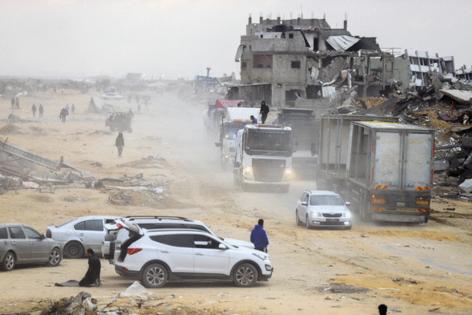Israel, Lebanon extend ceasefire as Gaza hostage obstacle clears
Published in News & Features
Israel and Lebanon agreed to extend their ceasefire until Feb. 18 to give Israeli troops more time to withdraw, the Trump administration said Sunday, while a Gaza dispute with Hamas over a hostage was resolved.
The developments came as Israeli television reported that President Donald Trump’s Middle East envoy, Steve Witkoff, would visit this week to advance the next phase of the deal with Hamas, which took effect on Jan. 19. Trump himself floated the possibility of having Jordan and Egypt take in Palestinian refugees, an idea quickly rejected in the region.
Earlier Sunday, at least 22 people were killed in southern Lebanon and more than 100 injured, according to Lebanese authorities, as hundreds of residents, some carrying Hezbollah flags, attempted to return to villages despite warnings by the Israeli army to stay out of parts of the country where its soldiers are still deployed. The Israeli military said it fired warning shots and apprehended some suspects.
The initial 60-day ceasefire in Lebanon was brokered by the U.S. and France. The arrangement will stay in effect until Feb. 18 and Lebanon, Israel and the U.S. will begin talks for the return of Lebanese prisoners captured after the Oct. 7, 2023 attack by Hamas on Israel, the White House said in a statement.
In Gaza, a dispute over civilian Israeli hostage Arbel Yehud was resolved with a deal to release another round of hostages on Thursday, including Yehud, a soldier, Agam Berger, as well as another unnamed hostage. Three more hostages will be released on Saturday, according to a statement from Israeli Prime Minister Benjamin Netanyahu’s office.
The dispute had led Israel to block tens of thousands of Palestinians from returning to northern parts of the enclave on Sunday, but that blockade will be lifted Monday morning, according to Netanyahu’s office.
While displaced Palestinians awaited their return home, Trump’s suggestion — “I’d like Egypt to take people and I’d like Jordan to take people” — was dismissed by both countries.
Egypt stands against displacing Palestinians, whether temporarily or permanently, because it may aggravate the regional conflict and undermine chances of peace, according to a Foreign Ministry statement.
When Israel sought to persuade Egypt to let Gazans into the Sinai peninsula in October 2023 to allow Israeli forces to attack Hamas without endangering civilians, Egypt rejected it and suggested Israel send Gazans to the Negev Desert instead.
“Jordan is for Jordanians and Palestine is for Palestinians,” Foreign Minister Ayman Safadi told reporters. The Palestinian Authority in the West Bank also rejected the idea.
Witkoff, Trump’s envoy, is scheduled to attend commemorations of the 1945 liberation of Nazi Germany’s Auschwitz death camp Monday in Poland. The White House didn’t respond to a request for comment on any further travel plans.
Friction over hostage releases arose after Yehud was replaced by another Israeli hostage released by Palestinian militants in a swap for Palestinian prisoners on Saturday. She’s being held by an offshoot of the Palestinian Islamic Jihad militia, not Hamas.
Israel also accused Hamas of violating the deal by failing to provide a list by a Saturday deadline detailing which of the more than 20 hostages that are expected to be freed in the coming weeks are alive.
This month’s Israel-Hamas agreement provides for the release of 33 hostages in exchange for hundreds of prisoners held by Israel and a partial Israeli withdrawal from Gaza. The sides are meant to negotiate a second and third phase to free remaining hostages, end the war and lay out a reconstruction plan.
Hamas has released seven female hostages, four of them soldiers. In exchange, Israel freed almost 300 Palestinian militants from its jails. The Saturday transfer of soldiers Karina Ariev, Daniella Gilboa and Naama Levy — all age 20, and Liri Albag, 19, took place in a ceremony at a public square staged by Hamas in a show of military power.
The women were among some 250 people, mostly civilians, taken hostage while another 1,200 were killed in Hamas’ Oct. 7 attack in southern Israel, the bloodiest day in the country’s history.
Israel’s offensive in Gaza has killed more than 47,000 people, according to the Hamas-run health ministry, which doesn’t distinguish between civilians and combatants. Most of the impoverished enclave’s 2 million Palestinians have been displaced and their infrastructure badly damaged.
____
(With assistance from Sherif Tarek.)
©2025 Bloomberg L.P. Visit bloomberg.com. Distributed by Tribune Content Agency, LLC.







Comments